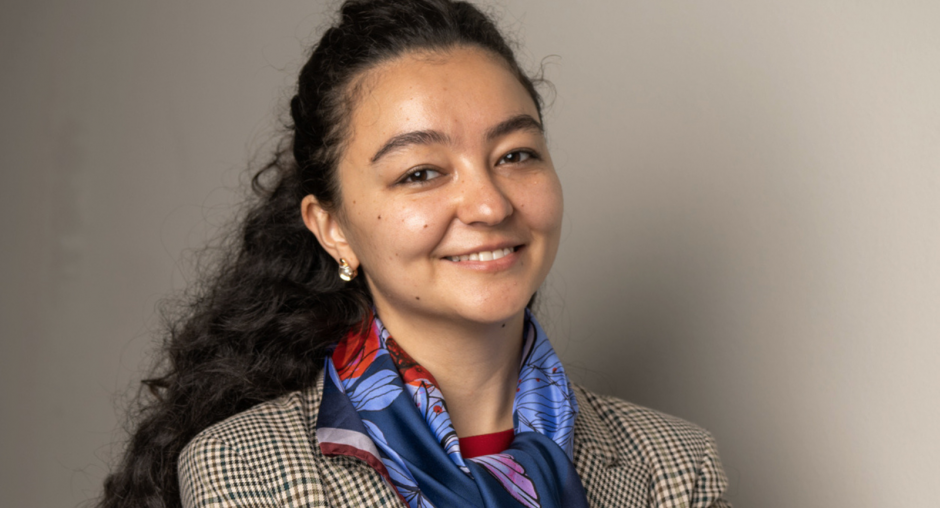Women’s Peace Leadership Programme: Leyla Zuleikha Makhmudova, Kazakhstan
Founder of FemAgora – a grassroots feminist organization that works in Central Asia – Leyla Zuleikha interconnects local issues of violence prevention, conflict resolution and peacebuilding to spotlight the regional coherence. While participating in WPLP, she researched the theories underpinning this work through a Master’s in Gender, Violence and Conflict at Sussex University as a Chevening Scholar. This dual ‘fellowship,’ as she calls it, has helped her to advance the peacebuilding programme at FemAgora.
Understanding the context
The conflicts in Central Asia are often referred to as latent, intractable or too small to pay attention to. There simply aren’t enough articulated ways to define and address them. For me, it was very important to understand how my experience and that of the people around me translate into the existing language of conflict resolution so that conflicts in our region are understood better.
WPLP has had a very strong influence on me. Talking to fellow participants from Central Asia has been especially valuable, as we share the same borders. Also, I understand that it is a privilege to be in the space of women peacebuilders. With European male experts dominating the security sector, few Central Asian women have access to platforms where we can learn from each other as equals. I came into the programme to understand how the path of women peacebuilders could look, and to better be able to visualise the careers, activities, and experiences of other women in peacebuilding.
I appreciate that WPLP is built on mentorship from more established women experts in peacebuilding and mediation. The supportive relationship I have built with my mentor Dr. Odeta Barbullushi, an Albanian foreign policy expert, will definitely outlive the 1-year programme.
A shared vision for Central Asia
At WPLP, I was also looking to meet and exchange with women in security in the Central Asian context. How does it work for us, where are we now, what are the shared challenges we face, how do we support each other, and what is our vision?
The challenges that we have in Central Asia are not exclusive to an isolated local or national context. We intersect in so many ways, and we share so many vital resources over the borders, which are the most populated areas in Central Asia. That is why for our region, which faces a persistent risk of incidents in the border areas, it is so important for us, the people who live there, to take a regional perspective.
We have much in common: we share water resources, land, heritage, kinship, and history. We need to appreciate that and find ways to trust each other. At FemAgora, our vision is to do it through supporting and resourcing women-led organisations and initiatives in the region.
Feminism as anti-violence work
I am a survivor of gender-based domestic violence. Part of the work that I lead within FemAgora is about including survivors of gender-based violence as stakeholders in anti-violence programmes, which is not very common yet.
For me, feminism is more of an approach to how we can resolve issues: it is about the agency of those who may not have the right resources right now. At FemAgora, we recognise the agency and expertise of local practitioners and help them find the resources they need. It is also about including us, as local women who are most affected by these issues, in the decision-making processes.
Feminism is also about not just gratifying activism and achievements of women at the grassroots level, but about ensuring adequate financial support for us as well.
Learning from the ancestors
Generations of women in my ancestry - my mother and grandmothers – have been engaged in forms of peacebuilding. I found out that my grandmother used a sophisticated, risky and very intricate method to protect her daughters with her own body, by lying on the doorstep of their room every night, so that nobody would enter and exercise violence. There are a myriad of strategies and ways of preventing violence and reinforcing peace practiced by women in Central Asia from generation to generation.
I don’t think that I consciously decided to be a peacebuilder at any point in my life. I just acquired the knowledge and the language to articulate my experiences and my work in peacebuilding.
Leyla Zuleikha is one of the 12 mentees from around the OSCE area and Afghanistan, participating in the OSCE Women’s Peace Leadership Programme 2022-2023, an initiative of the OSCE Secretary General Helga Maria Schmid. The Programme aims to strengthen the ability of women to meaningfully engage and influence peace processes at all levels. It is a part of the OSCE’s flagship project WIN for Women and Men, which covers the Networking platform for Women Leaders including Peacebuilders and Mediators. The WIN project works with OSCE-supported networks and gives rise to new networks, fostering women’s participation and leadership, as well as broader men’s engagement in achieving gender equality.



